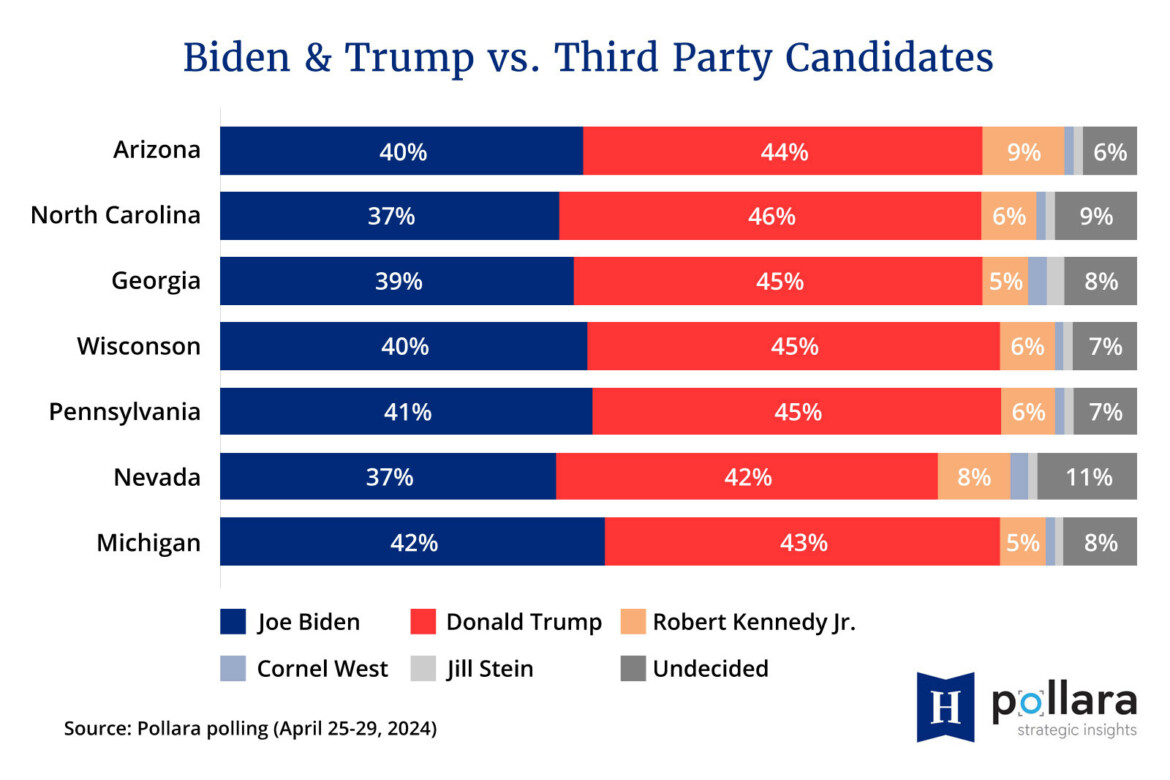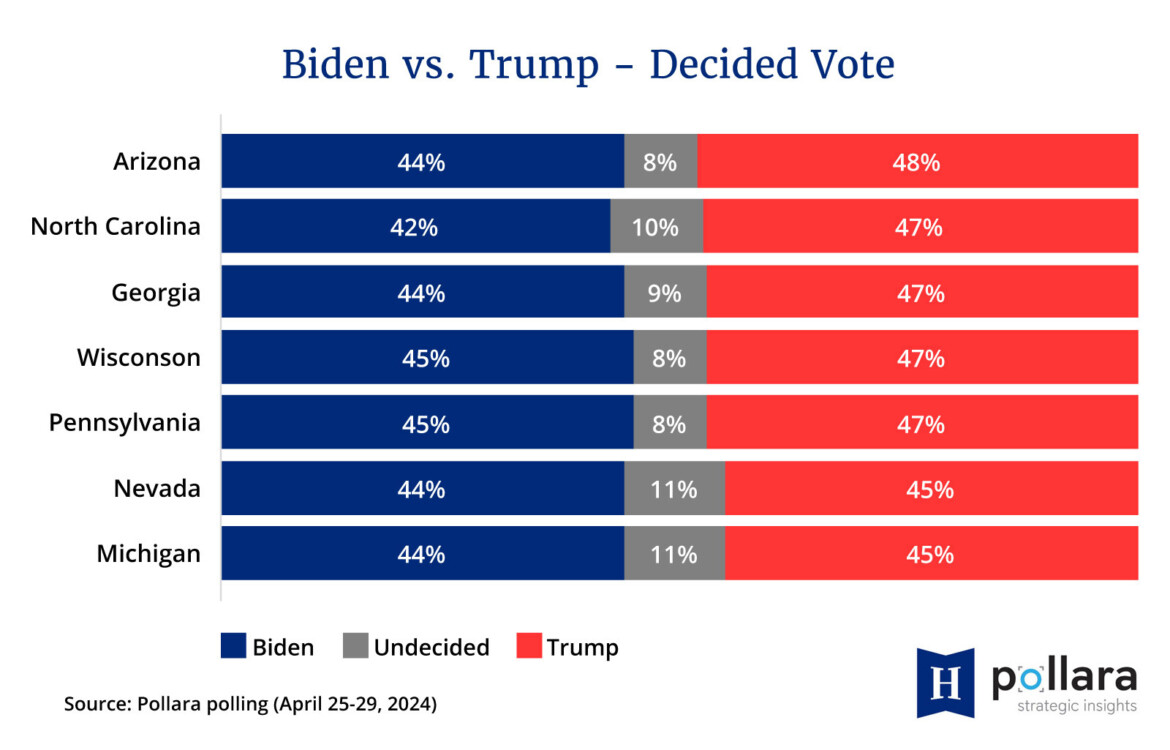
In the lead-up to the November 2024 U.S. presidential election, The Hub and Pollara are teaming up to provide insights into what Canadians make of the race as it unfolds. Pollara senior advisor Andre Turcotte will provide exclusive polling and analysis to Hub readers, helping them understand how fellow Canadians are making sense of the election and its implications for Canada.
While the public is captivated by the sordid tale of Donald Trump’s hush money trial currently ongoing in New York City, taking in the unsavoury details of alleged payments by the former president to a Playboy Playmate and to a porn star, they seemingly haven’t been turned off by the ordeal. In fact, the man facing trial is slowly pulling ahead in the 2024 U.S. presidential race.
In January, Pollara Strategic Insights began a partnership with Emerson College to look at the U.S. presidential election from both a Canadian and U.S. perspective. Emerson College recently completed an extensive survey of Americans between April 25-29, 2024 in seven swing states. A total of 7,000 registered U.S. voters were interviewed for this study and the results are clear. In short, Trump leads in all seven swing states.

A lot of attention has been given to the fact that at the national level, Biden and Trump are in a virtual dead heat in popular support. According to the latest data at the polling aggregation website FiveThirtyEight, Trump stands at 41.4 percent, virtually tied with Biden at 40.7 percent. Emerson College’s latest national findings from April 2024 show Trump at 46 percent, barely ahead of Biden at 43 percent.
While the national picture is interesting, it may not tell us much useful about the election’s outcome. The U.S. presidential election will be won or lost in a few key swing states. When the focus is put where it matters—as in the latest Emerson College polling—a more definite picture emerges.
At this moment in time, Trump leads by five points in North Carolina, four points in Arizona, three points in Georgia, and two points both in Pennsylvania and Wisconsin. Trump is ahead by only one point in Michigan and Nevada. Granted, all those leads are small, but we cannot dismiss that Trump is indeed leading in every one of those crucial states. Back in 2020, Biden won six of those seven states, only losing to Trump in North Carolina.

When we introduce the complicating issue of third-party candidates in the election, especially the candidacy of Robert Kennedy Jr, the situation gets even rosier for the former president. While third-party candidates have no discernible impact in Arizona and Michigan, adding RFK Jr. on the ballot benefits Trump in the other five states. Specifically, Trump’s lead over Biden increases from five to nine points in North Carolina, three to six points in Georgia, two to five points in Wisconsin, and two to four points in Pennsylvania. Moreover, with RFK Jr. on the ballot in Nevada, this race is no longer a toss-up and Trump enjoys a comfortable five-point lead in the Silver State. To put it plainly, the candidacy of RFK Jr. is hurting Biden more than Trump.

These findings are significant because if this holds, Trump will likely get 311 Electoral College votes, well ahead of the 270 he needs to get back to the White House and five more than Biden won in 2020.
Not enough attention is given to the state of the election from the perspective of the Electoral College. Without getting into too many details, it is important to remember that the U.S. president is not elected based on the popular vote but through the arcane Electoral College system. The Electoral College, as used in the U.S. for electing the president and vice president, assigns each state a specific number of electors based on its congressional representation (senators plus representatives). These electors, selected by the state’s political parties, subsequently vote for the president and vice president. The candidate securing the majority of electoral college votes nationwide is declared the president-elect. This system is designed to alleviate the dominance of the more populous states over smaller ones. This is the election result that will matter on November 5, 2024, and Trump has a solid lead. This has ramifications for Republicans and Democrats.
What it means for Republicans
Some establishment Republicans may be uneasy with Trump’s style and rhetoric, but most have come to accept that the former president is effectively tapping into public sentiment. A Pew Research Study conducted in January 2024 shows that many Americans in general and Republicans in particular lack trust in many institutions. Specifically, most Republicans have a negative perception of large corporations, banks and other financial institutions, technology companies, public schools, labour unions, and colleges and universities.
With his oft-repeated pledge to “drain the swamp,” Trump has positioned himself as the champion of ordinary Americans against nefarious institutions which are seen as having a negative impact on “the ways things are going in the country these days.” Maybe even more effective is Trump’s promise to be “the voice” of his supporters. In another Pew Research Study, this one conducted in July 2023, 85 percent of Americans say, “Most elected officials don’t care what people like them think”. Moreover, only 4 percent of Americans think the political system is working well, and 59 percent are angry at the federal government. Trump is promising to speak for them, and many Americans are believing him.
What it means for Democrats
Denial is known as the first stage in the grieving process and Democrats are solidly ensconced in that sentiment. Fair or unfair, Biden is a liability. The recent Emerson College Poll shows that a majority of voters in every one of the seven swing states disapprove of his performance. And to reiterate, Biden won in six of those seven states in 2020.

While “age” is often mentioned as the main reason Americans have reservations about re-electing Joe Biden, his campaign has made strategic mistakes that have contributed to his lagging vote support. For instance, while Trump is the voice of disaffected Americans, Biden appears tone-deaf to their plight. If we take the cost-of-living issue as an example, Trump is quick to tell Americans that “he feels their pain” and promises to bring things back to what they were when he was president. For his part, Biden tends to lecture Americans. He tells them their pain must be imaginary since the cost of living is decreasing despite how Americans may be feeling. Pointing to aggregate economic data is a poor substitute for daily experience.
Maybe more damaging is the apparent decision by Biden and his team to let other institutions do the heavy work for them in the election. The Biden team gambled that the court system would do enough damage to Trump’s image that they wouldn’t have to go after their opponent. They have abdicated their responsibility to bring the fight to Trump on the assumption that a former President sitting in court would be disqualifying. Once again, Trump has turned this to his advantage, presenting himself as the persecuted rather than the prosecuted.
Predicting the outcome of any election is fraught with risk, especially six months in advance. But the purpose of an early look at vote intent is not to predict but to illuminate. For Republicans, the data confirms that for better or worse, Trump has a clear path to the White House and that staying the bumpy course is electorally beneficial. For Democrats, time is running out and a serious course correction is needed. They need to move to the next stage in the grieving process: anger. Democrats must recognize that relying on external forces and institutions to secure victory in November is doomed to fail. If not, American voters may well move Democrats along to the final stage of grief: acceptance.




